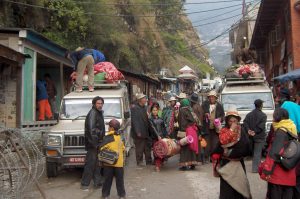
Tibetan refugees arrive in Nepal in 2005.
These representations, focusing on the Dalai Lama apparently warning against ‘Arab domination’ and Europe taking in ‘too many’ migrants are ultimately inconsistent with the well-known and compassionate approach of the Dalai Lama, who has been a refugee himself for more than half a century, and the longer-term perspective he seeks to convey.
Nobel Peace Prize Laureate the Dalai Lama has for decades advocated tolerance, inter-religious dialogue and has rejected the concept of a clash of civilizations, calling it “false and dangerous.” It is ludicrous and clearly out of context to assert that the Dalai Lama would seriously state that Germany is at risk of becoming ‘Arab’ as a result of the refugee crisis.
Over the years, violent conflicts across the globe have forced a staggering 60 million people from their homes, many of whom, like the Dalai Lama, have little realistic prospect of returning home. According to the UN High Commission for Refugees, the number of refugees and internally displaced people has reached its highest point since World War II.
The Dalai Lama has consistently called on the international community to both provide assistance to those in imminent danger and need, and at the same time, to work to solve the violent conflicts and man made disasters that are the root causes of the humanitarian crisis.
As he continues to praise the countries that act responsibly and with compassion towards refugees, including Germany, the Dalai Lama has not shied from stressing that the only long-term solutions to this crisis would be to work more effectively to solve the conflicts that are forcing people to flee from their homeland. He has consistently stressed that all of us must do everything we can to restore peace to the lands these refugees are fleeing.
Every refugee yearns for the day in which he or she can go back to his or her homeland without being in danger. Helping to achieve this goal is the primary responsibility of the international community and of responsible nations.
Acknowledging this reality means in no way endorsing the idea that refugees should not be welcomed to Europe.
The Tibetan term for compassion, ‘nying-je’, means love, affection, warm-heartedness. But also, more importantly, it denotes a feeling of connection with others. As the Dalai Lama pointed out to The Big Issue, a newspaper for the homeless: “As a refugee myself, I naturally feel a connection to those fleeing Syria and other places due to the crisis engulfing these countries.”

Thank you Matteo for your comments. Your description of His Holiness’ fundamental thinking on and attitude towards this issue has been clipped and precise. I have been in contact with my colleagues in Dharamsala who have been present at the interview. According to their notes of the interview – if we leave out the lighthearted and playful remarks ( as we are all familiar with his hummorous, easy-going and informal way in meetings) made in answering the question – the gist of His Holiness’ statement on the issue can be summarized as follow: His Holiness, while replying, told the journalist that the refugee crisis in Europe is complex. However, he said that when we see the expressions on their faces, particularly the women and children, and see their desperate and sad situation, we must help them in any way we can. Yet, struggling to accommodate refugees in daunting numbers poses practical challenges and problems. He came to know also how some in the host countries feel apprehensive of being overwhelmed. More important in the long term is restoring peace to the lands where these refugees have fled from, so they can return home eventually.
He further stressed that help in the meantime must include ensuring their children are educated and youths acquire skills to be able to contribute to a brighter future when that time comes.
My name is TenzinTashi ! I am born in Tibetan. I am came to India 1990 ,9,15 reached in Nepal!
We are happy for you dear Tenzin Tashi. I hope you feel welcome to Nepal. Namaste.
I feel the Dalai Lama’s comment about too many refugees is true on so many levels, religious conflict, economically, culturally. I think the world should be contributing massively for them to safely and securely go back home.
Please release all of our prisoners in tibet.
as you rightly point out, Matteo, HH the Dalai Lama has always advocated tolerance and inter-religious dialogue, as a refugee himself for over half a century. in addition he has stressed one crucial point, something the international community has failed to adequately address, that is to do more to solve the conflicts, the root cause of the crisis. so nothing in the words and reflections of the Dalai Lama could ever come close to such allegations made in the media by those who actually fail to promote tolerance and instead are engaged in an opportunistic, hostile and alarmist discourse against ’the other’. they would contribute much more by promoting compassion, the kind the Dalai Lama represents, and help embrace and not reject ‘the other’.
Thank you Matteo for the precise and attentive analysis.
Media corporations and journalists focus only on creating sensationalism censoring context in a rude, unfair and offensive manner.
The Dalai Lama is again victim of false accusations due to a BBC journalist that took His Holiness words on women, one more time, out of context. Sadly.
Is this dishonest or not?
Namaste